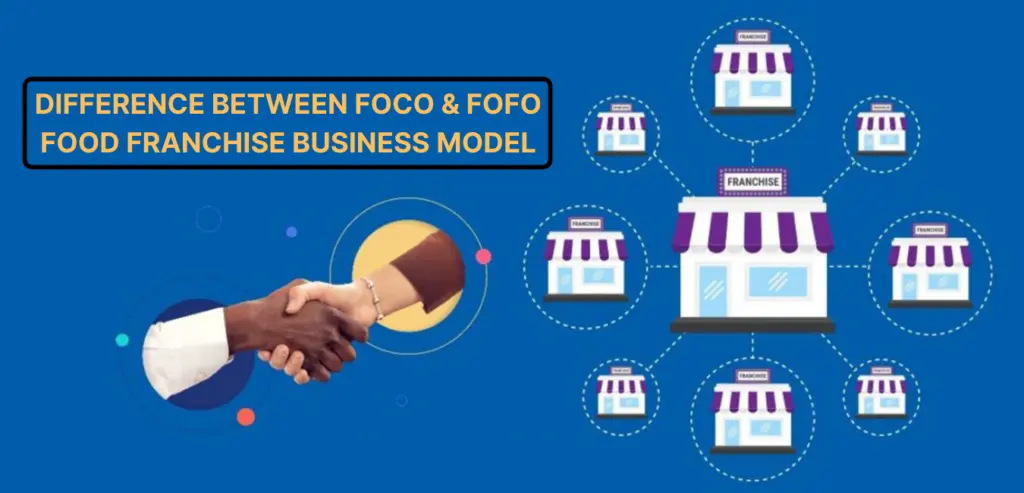FOCO and FOFO Model:-
1. FOCO Model: Franchisee-Owned, Company-Operated
What is FOCO?
The FOCO model entails a partnership where the franchisee owns the business, but the company takes charge of its operations. In the context of Cloud Kitchens and food franchises, this means the company manages the day-to-day running of the kitchen while the franchisee reaps the benefits of ownership.
Benefits of FOCO Model:
- Expertise-Led Operations: The company brings its expertise to efficiently manage operations.
- Brand Consistency: Ensures uniformity in brand standards and customer experience.
- Reduced Operational Burden: Franchisees can focus on ownership without the day-to-day operational hassles.
2. FOFO Model: Franchisee-Owned, Franchisee-Operated
What is FOFO?
In the FOFO model, the franchisee not only owns the business but also manages its day-to-day operations. This hands-on approach requires the franchisee to take charge of staffing, kitchen operations, and overall business management.
Benefits of FOFO Model:
- Entrepreneurial Control: Franchisees have full control over their business operations and strategies.
- Flexibility: Allows for adaptation to local market trends and preferences.
- Direct Profit Potential: Operational successes directly impact the franchisee’s profitability.
FOCO and FOFO Model: Choosing the Right Model for You
Cloud Kitchens and Food Franchises in India:
- Operational Involvement:
- FOCO: Limited operational involvement for the franchisee.
- FOFO: Hands-on management of day-to-day operations by the franchisee.
- Expertise and Support:
- FOCO: Leverages the company’s expertise in operations.
- FOFO: Requires the franchisee to develop operational know-how.
- Brand Consistency:
- FOCO: Ensures consistent brand standards under company management.
- FOFO: Allows for flexibility, potentially adapting to local preferences.
5 Biggest Differences Between FOCO and FOFO Model
1.) Ownership

In the FOCO and FOFO Model, the franchisee owns the business while the company operates it. This means that the franchise investor gives a one-time lump sum payment based on which they establish the business. The franchiser handles all the legalities and paperwork based on the money given by the franchisee. This lends a professional business approach to the franchise and also takes the day to day business running out of the franchisee’s hands. In contrast, the FOFO model requires the franchisee to handle all daily processes. So, the investor has to handle the everyday management tasks including the establishment purchase/rent and upkeep, employee retention and other processes.
2.)Running Cost
The primary benefit of using a FOCO and FOFO Model is that the company offering the franchise investment option hands everyday expenses. So, the franchisee’s daily involvement is not required. On the other hand, FOCO and FOFO Model for franchises require everyday oversight and this can lead to operational redundancies. Since they are not likely to be familiar with the various daily expenses as well as their recordkeeping, running costs can get out of hand. Worse yet, improper accounts management can cause financial liabilities as well as legal ones. This will obviously adversely affect the brand reputation of the franchiser and may create similar problems for them as well. So, the FOCO model offers a better daily working solution for both franchisers and investors alike.
3.)Profit Share

Both FOCO and FOFO models have their positives for establishing franchises. The key difference for profit sharing is that the FOCO model takes the liability off the investor. They get a share of the profits made by the company-owned cloud kitchen. This ensures the investor gets a steady source of income. Unlike this process, the FOFO model offers a potentially higher profit share to the investors. However, this is predicated on their business management proficiency. This is beneficial for only those who are willing to invest time and effort into churning out a high profit from their franchise.
4.) Promotion

Marketing activities are an essential part of any company’s operational cycle. With the FOCO model, the franchisee does not have to handle the marketing and promotional activities. For some cloud kitchens, getting involved in marketing activities can help bolster sales and increase profit. However, the FOFO model will require the franchisee to handle all businesses activities including marketing and promotion. This puts the burden of effort completely on the franchisee and they may not have good experience of it. Naturally, this would reduce the effectiveness of the marketing and promotion activities.
5.) Success
The long-term success of a company depends on the practical adaptability of a business. Franchises have the same story and if the operator does not have the right skill, they can lose business quickly. This problem is easily solved by the FOCO model which does not require the franchisee’s involvement. But with the FOFO model, the franchisee will need to invest time into the business. Otherwise, its long-term success is not certain.
Which FOCO Food and Beverage Franchise Should You Invest in 2021?
The Rolling Plate has one of the best FOCO and FOFO Model stories in the entire Indian FnB industry. Since starting in 2019, we have opened up 12 franchises and are verging on new establishments every new month. Naturally, our success has drawn a lot of attention and we are expecting an unprecedented interest in our franchise offerings in 2021. if you are looking for the best FnB industry investment opportunities in the market, TRP is the right one for you!
Also read: Cloud Kitchen Food Franchise Business Model In India


Pingback: Best low investment cloud kitchen food franchise business in 2021-The Rolling Plate - Food Franchise opportunity- Cloud kitchen business model
Pingback: Most Profitable Franchise Business in India in 2021